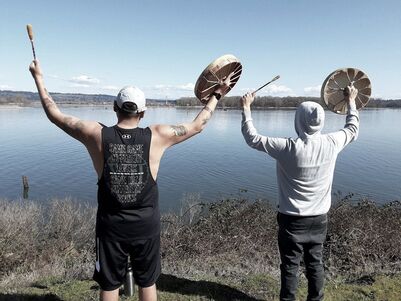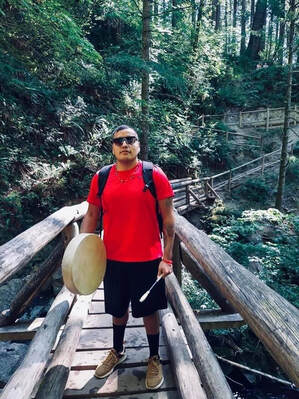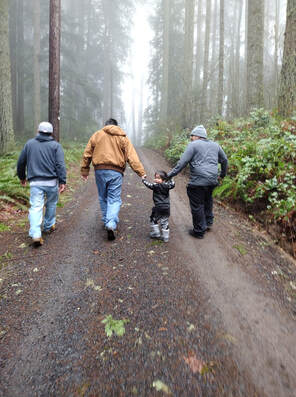Outpatient Substance Abuse Services
MWRS A&D Outpatient Services serves adults (ages 18 and above). MWRS recognizes the evidence of healing that happens
when gender issues are addressed, and eligible adults receive gender specific services when possible, including
collaboration with community partners to achieve the best treatment experience for you..
MWRS utilizes the Medicine Wheel in a variety of ways, including as a guide for human development, connection to others, wellness,
and to conceptualize and connect the skills that are promoted in individual and group session, and recovery related activities.
All service recipients are placed according to ASAM level of care criteria, and participate at the least intrusive level where therapeutic
gains can occur. Regular service review ensures fluidity in level of care and planning of service activities.
Mental health symptoms are examined as important issues as they connect to recovery and general life functioning.
MWRS Provides the following ASAM Level of Care Treatment Services as defined by the Oregon Health Authority, Health Systems Division: Behavioral Health Services - Chapter 309, Division 19, Outpatient Behavioral Health Services 309-019-0100 :
“Early Intervention ASAM Level of Care 0.5 (ASAM Level 0.5)” means organized services designed to explore and address problems or risk factors that may be related to substance use and assist individuals in recognizing the harmful consequences of high-risk substance use and addictive behavior. ASAM Level 0.5 may be delivered as a Driving Under the Influence of Intoxicants (DUII) service where the length and number of contacts may be mandated, and completion of the program may be a prerequisite to the reinstatement of driving privileges. Individuals eligible for this ASAM level of care do not meet DSM-5-TR diagnostic criteria for a substance use disorder.
“Outpatient Substance Use Disorder Services ASAM Level of Care 1” means organized services delivered in a variety of settings and include a vast array of outpatient services and supports, which are tailored to the severity and function of the individual and typically are less than 9 contact hours per week. ASAM Level 1 programs enhance access to care and facilitate earlier engagement into treatment. Services and supports address major lifestyle, attitudinal and behavioral issues related to the substance use that detract from progress towards service plan goals.
“Intensive Outpatient Substance Use Disorder Services ASAM Level of Care 2.1” means structured services and supports, mostly comprised of counseling and education. Mental health services are either offered by the program or tightly coordinated with a community provided. When planning a transition to ASAM Level 1 services, a program may provide less than the minimum number of contact hours for up to two weeks: 9 for adults and 6 for children.
“Partial Hospitalization Services ASAM Level of Care 2.5” means clinically intensive programming of 20 contact hours or more per week,
which is specified by the service plan. Needs identified in Dimensions 1, 2 and 3 warrant daily monitoring or management within an outpatient or
combined in a residential setting. Programs staff interdisciplinary teams and offer intensive case management.
Psychiatric and medical services are either offered by the program or coordinated.
MWRS strives to provide effective, culturally informed services that restore health to individuals, families, tribes, and communities.
The MWRS team has a strong social justice foundation; issues such as poverty, racism, and all forms of discrimination
and oppression impact the mental and emotional wellness of the individuals receiving treatment services,
and are therefore priorities to be addressed in service planning and delivery.
when gender issues are addressed, and eligible adults receive gender specific services when possible, including
collaboration with community partners to achieve the best treatment experience for you..
MWRS utilizes the Medicine Wheel in a variety of ways, including as a guide for human development, connection to others, wellness,
and to conceptualize and connect the skills that are promoted in individual and group session, and recovery related activities.
All service recipients are placed according to ASAM level of care criteria, and participate at the least intrusive level where therapeutic
gains can occur. Regular service review ensures fluidity in level of care and planning of service activities.
Mental health symptoms are examined as important issues as they connect to recovery and general life functioning.
MWRS Provides the following ASAM Level of Care Treatment Services as defined by the Oregon Health Authority, Health Systems Division: Behavioral Health Services - Chapter 309, Division 19, Outpatient Behavioral Health Services 309-019-0100 :
“Early Intervention ASAM Level of Care 0.5 (ASAM Level 0.5)” means organized services designed to explore and address problems or risk factors that may be related to substance use and assist individuals in recognizing the harmful consequences of high-risk substance use and addictive behavior. ASAM Level 0.5 may be delivered as a Driving Under the Influence of Intoxicants (DUII) service where the length and number of contacts may be mandated, and completion of the program may be a prerequisite to the reinstatement of driving privileges. Individuals eligible for this ASAM level of care do not meet DSM-5-TR diagnostic criteria for a substance use disorder.
“Outpatient Substance Use Disorder Services ASAM Level of Care 1” means organized services delivered in a variety of settings and include a vast array of outpatient services and supports, which are tailored to the severity and function of the individual and typically are less than 9 contact hours per week. ASAM Level 1 programs enhance access to care and facilitate earlier engagement into treatment. Services and supports address major lifestyle, attitudinal and behavioral issues related to the substance use that detract from progress towards service plan goals.
“Intensive Outpatient Substance Use Disorder Services ASAM Level of Care 2.1” means structured services and supports, mostly comprised of counseling and education. Mental health services are either offered by the program or tightly coordinated with a community provided. When planning a transition to ASAM Level 1 services, a program may provide less than the minimum number of contact hours for up to two weeks: 9 for adults and 6 for children.
“Partial Hospitalization Services ASAM Level of Care 2.5” means clinically intensive programming of 20 contact hours or more per week,
which is specified by the service plan. Needs identified in Dimensions 1, 2 and 3 warrant daily monitoring or management within an outpatient or
combined in a residential setting. Programs staff interdisciplinary teams and offer intensive case management.
Psychiatric and medical services are either offered by the program or coordinated.
MWRS strives to provide effective, culturally informed services that restore health to individuals, families, tribes, and communities.
The MWRS team has a strong social justice foundation; issues such as poverty, racism, and all forms of discrimination
and oppression impact the mental and emotional wellness of the individuals receiving treatment services,
and are therefore priorities to be addressed in service planning and delivery.
MWRS Outpatient program includes:
Integration between substance abuse/addiction services, mental health counseling, problem gambling services,
cultural and spiritual activities, mentorship, case management, and supportive services. This includes individualized,
culturally informed, goal-oriented service planning and ongoing assessment and service review.
Therapeutic interventions delivered in a variety of learning environments, including groups, individual therapy sessions,
community-based activities, and experiential learning.
Cognitive and/or Behavioral interventions that are culturally sensitive, informed, and respectful.
MWRS utilizes multiple curricula, evidence based practices, and therapy models during service delivery, including but not limited to:
Integration between substance abuse/addiction services, mental health counseling, problem gambling services,
cultural and spiritual activities, mentorship, case management, and supportive services. This includes individualized,
culturally informed, goal-oriented service planning and ongoing assessment and service review.
Therapeutic interventions delivered in a variety of learning environments, including groups, individual therapy sessions,
community-based activities, and experiential learning.
Cognitive and/or Behavioral interventions that are culturally sensitive, informed, and respectful.
MWRS utilizes multiple curricula, evidence based practices, and therapy models during service delivery, including but not limited to:
|
MRT (Moral Reconition Therapy)
Dialectical Behavior Therapy Skill Building-DBT (emotional regulation, self-awareness, interpersonal effectiveness) Native Wellness Healthy Relationships and Youth Empowerment Curricula White Bison Resources (Medicine Wheel and the 12 Steps, Mending Broken Hearts, Mothers of Tradition, Fathers of Tradition, Red Road, Warrior Down) EMDR (Eye Movement Desensitization and Reprocessing) Cognitive Behavioral Therapy (CBT) Cultural Tobacco—ceremonial use vs. misuse and Intro to Smoking Cessation Infectious Disease Education and Risk Management Lifeskills in Recovery PAK-Physical Activity Kit for Native Americans A&D Education and Medicated Assisted Treatment Education and support Cognitive Behavioral Interventions, including CBI-CC, Thinking for Change, Mentoring Against Negative Actions Motivational Interviewing, and MI adapted for use with Native Americans Motivational Enhancement Strategies, including incentives and positive reinforcement |
Trauma informed practices
Trauma Recovery and Empowerment Model Narrative Therapy, Solution Focused Brief Therapy, Acceptance and Commitment Therapy Multi-Stage Relapse Prevention including Introduction to relapse prevention and advanced relapse prevention GEAR for Gambling, Want to Stop Gambling, Problem Gamblers and Their Finances Regular and random drug screening (urinalysis) Peer support from Certified Recovery Mentors and Peer Support Specialists Domestic violence education Tribal best practices, including Sweat Lodge, Talking Circle, Art Therapies, Prayer, Cradleboard lessons, Storytelling, Positive Indian Parenting, Drumming and Drum Making, Horse Related Activities, Basketball/Softball We R Native Youth Curriculum including: Circle of Life, Healing of the Canoe, Native Its Your Game, Native Stand, Native Voices, Safe in the Village ASSIST and Mental Health First Aid for suicide assessment and prevention Historical Trauma and Unresolved Grief Medicine Wheel Recovery Services Participant Workbook |
Integrated Services and supports for individuals diagnosed with co-occurring disorders (basic criteria of having a DSM-V-TR diagnosis of both a substance use disorder and a mental health disorder) delivered by multidisciplinary teams. All integrated services are delivered simultaneously with substance abuse services, including integrated assessment, service record, and triaged service planning. Service recipients participate in service planning and creation of a proactive safety and crisis plan. All co-occurring services support the individual in obtaining and maintaining sobriety.
Integrated services provided by MWRS include:
Integrated services provided by MWRS include:
|
Integrated Bio/Psycho/Social/Spiritual assessment and continued, ongoing assessment
All services provided with responsiveness to the individual’s trauma history Service planning with individual input and collaboration between service providers, and individualized care Regular reassessment of level of care, and service planning that supports appropriate LOC and stage of change Strengths-based approach, with integrated treatment methods Personalized education, including how substance use impacts mental health wellness Individual therapy/counseling Skill building to increase ability to manage symptoms Skill building to increase self-awareness and manage emotions |
Cultural assessment and inclusion of culture and spirituality in service planning
Support to engage in family and community Family involvement, when appropriate Group therapy sessions with opportunity for process, education, and practicing skills Referral for medication management to community partners Collaboration with partnering agencies, as appropriate Integrated relapse prevention that lessens the risk of substance and behavioral relapse due to poor emotional functioning Referral to community partners (mental health programs) for individuals with severe and persistent mental health issues that MWRS is not specialized in providing Referral to community partners for supportive services (dental, medical, vocational, housing, education, etc.) Safety and crisis planning |
Collaboration with Community Partners
MWRS works hard to provide the best services possible to the individuals we serve. Some of our service participants may be involved with
and/or need assistance with issues such as drug court/criminal justice systems, DHS systems, Veterans court, tribal courts and social service systems, federal court systems, etc. We work alongside community partners and entities to assist and advocate for our participants in establishing the strongest foundation possible for successful re-entry back into their families and communities. MWRS recognizes some of the unique challenges for individuals involved in the criminal justice system, including barriers to housing, employment, education, stigma, and broken trust with family and the community.
MWRS provides services to address many of these issues, including:
MWRS works hard to provide the best services possible to the individuals we serve. Some of our service participants may be involved with
and/or need assistance with issues such as drug court/criminal justice systems, DHS systems, Veterans court, tribal courts and social service systems, federal court systems, etc. We work alongside community partners and entities to assist and advocate for our participants in establishing the strongest foundation possible for successful re-entry back into their families and communities. MWRS recognizes some of the unique challenges for individuals involved in the criminal justice system, including barriers to housing, employment, education, stigma, and broken trust with family and the community.
MWRS provides services to address many of these issues, including:
|
Regular assessment for risk of recidivism
Collaborative integrated substance abuse, mental health, and problem gambling services Collaborative treatment planning that includes that referent, and regular reporting of progress to referent (per individual consent) |
Education on navigating community resources
Providing support to access needs for cultural and spiritual health identified by participant Community relationships to provide service/volunteer opportunities for individuals in treatment |
Life Skills groups that address employment readiness and education preparedness
Communication education and skills training Parenting classes Renters Education |


